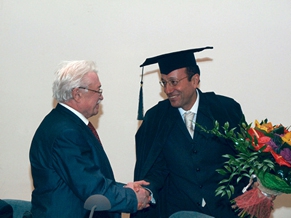|
Euroasian Jewish News

RASS President, academician Gennadiy Osipov congratulates Alexander Mashekvich
|
EAJC President Becomes Academician
12.01.2011 The President of the Euro-Asian Jewish Congress, Doctor of Philosophy Alexander Mashkevich has been elected a full member of the Russian Academy of Social Sciences (RASS). This was announced by the President of the Academy, a full member of the Russian Academy of Sciences (RAS) Gennadiy Osipov at a joint assembly of the RASS and the Academic Board of the RAS Institute of Socio-Political Research, which took place on the 12th of December in the President Hall of the main RAS building in Moscow.
The unanimous election was a sign of acknowledgment of Alexander Mashkevich's achievements in developing intercivilizational dialogue, his contribution to the academic study of the interaction between peoples and cultures. When presenting the diploma to Mashkevich, Dr. Osipov also said that the Academic Board of the Institute of Socio-Political Research, having a high opinion of the research work of the EAJC President in the political and social sciences, has awarded him an honorary doctoral degree of the Institute and has petitioned for awarding him a honoris causa doctoral degree in politology.
The first RASS meeting of 2011 was dedicated to the spiritual and moral unity of the main faiths of Russia. Alexander Mashkevich presented the main report. He gave his vision of the history of civilizations as a long journey from estrangement to dialogue, work to find common ground, common moral stances, values, and principles. This report summarized the results of Alexander Mashkevich's many years of work, which have also found an embodiment in a recently-published six-volume publication of his collected scientific works.
"The history of civilizations in general is also the history of intercultural interaction," the EAJC President noted. "But it is important to understand that such an interaction cannot be meaningless. Our interaction or dialogue are not the only important things. The answer to where we are going, why, and for what reason is also important."
The discussion on the report was spearheaded by the rector of the Moscow State Institue of International Relations, RAS academician Anatoliy Torkunov, rector of the Russian State Social University, RAS academician Vasiliy Zhukov, the President of the Russian Federation Military Commanders' Club, RASS academician Anatoliy Kulikov, and others.
At the end of the meeting, an agreement between the RAS and the EAJC President to create a Social Studies Support Fund was announced. As Alexander Mashkevich noted, "sociology is not given proper attention today, while at the same time the questions of education, culture, and economics require responsible research more and more. This research must be encouraged, and a worthy place found for these questions."
The task of the fund is not only the support of talented young scholars and their promising research projects with grants, but also the creation of a prestigious international award to denote the main advancement in social and political science.
RUSSIAN ACADEMY OF SOCIAL SCIENCES (RASS) had been formed on November 12, 1993. It was registered at the Russian Federation Ministry of Justice as an all-Russian self-governing community organization. The Academy unites important scholars and public activists who work in social science (sociologists, politologists, demographists, economists, legalists, ethnologists) regardless of their political position and ideological sympathies and antipathies. It numbers over 600 important scholars and practical workes, including 19 academicians and corresponding fellows of the Russian Academy of Sciences, 48 foreign scholars from the USA, Germany, Yugoslavia, the Czech Republic, Finland, Italy, China, Kuwait, and a number of CIS countries. At the moment the Academy has 63 structural divisions.
|
|
